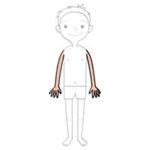|
Từ điển Oxford Advanced Learner 8th
arms

arms BrE [ɑːmz] NAmE [ɑːrmz] noun plural
1. (formal)weapons, especially as used by the army, navy, etc
•arms and ammunition
• Police officers in the UK do not usually carry arms.
see also ↑firearm, ↑small arms
2. = ↑coat of arms
•the King's Arms (= used as the name of a pub)
more at bear arms at ↑bear v., present arms at ↑present v.
Idioms: ↑lay down your arms ▪ ↑take up arms ▪ ↑under arms ▪ ↑up in arms
Word Origin:
Middle English: from Old French armes, from Latin arma.
Thesaurus:
arms [arms] noun pl.
•Rebels took up arms against the state.
weapons • • armaments • • munitions •
nuclear/conventional arms/weapons/armaments
carry arms/weapons
a/an arms/weapons/armaments/munitions factory
Example Bank:
•He was accused of supplying arms to terrorists
•The country's economic growth could fuel an arms build-up.
•The government called on them to lay down their arms and surrender.
•The people took up arms to defend their country.
•The right to bear arms is enshrined in the Constitution.
•There were more than a million men under arms during the American Civil War.
•fighters using small arms and home-made grenades
•It was the first ‘modern’ war, with more than a million men under arms.
•Police officers in the UK do not usually carry arms.
•The UN imposed an arms embargo on the country.
•The arms race between the superpowers escalated still more.
•The government was blamed for the shortage of arms and ammunition during the first two years of the war.
•The royal arms appear on the door of the Queen's carriage.
|
|
|
|
